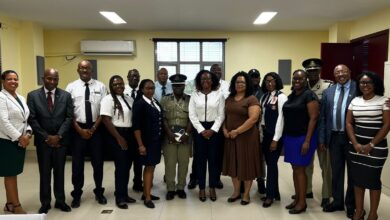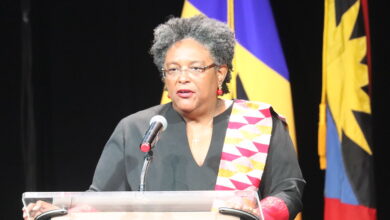Georgetown, GINA, November 14, 2015
Guyana’s achievement in the battle against HIV/AIDS compared with some countries in the Caribbean has been described as remarkable. This is according to United Nations Secretary General Special Envoy for HIV in the Caribbean, Dr. Edward Greene.
Dr. Greene, in a recent interview with the Government Information Agency (GINA), disclosed that, “we have to look at the developments over the last ten to fifteen years and when we compare the Guyana status, in terms of HIV prevalence from 2000 to 2015, remarkable progress has been made.”
Information provided has shown that in 2001, only seven to eight percent of the HIV/AIDS population were having access to treatment; the 2012 statistics now show that access to treatment has been improved to more than 50 percent.
The UN envoy further stated that “although we need to increase that number, the remarkable progress is what I want to point out.”
Guyana was also lauded for the reduction in deaths from HIV/AIDS over the past 15 years; this calculates to a 70 percent reduction.
“I think that you have something to celebrate, because Guyana is one of those countries that were successful in eliminating the mother to child transmission,” Dr. Greeneinformed. A survey is expected to be done in a few months’ time to determine definitely whether Guyana has completely eliminated PMTCT, so the country can be officially certified.
Guyana has done well with PMTCT

According to UNAIDS Country Director, Dr. Martin Odiit, who was also part of the interview, the prevention of mother to child transmission (PMTCT) in Guyana and the Caribbean has making great progress.
“As you know the world would like to eliminate this and to do so you have to reduce the infection from the mother to the child, and this involves ensuring that mothers access treatment, so yes, Guyana has been doing very well,” Odiit stated.
“A few other countries are also on the verge of reaching this status. We are hoping that the Caribbean region will be one of the first to declare it has eliminated mother to child transmission,” the UNAIDS country Director advised.
Dr. Greene, in adding his bit to the issue, stated that “we are hoping that by 2016, the entire Caribbean can declare that it has eliminated mother to child transmission.”
Challenges
Like all other programmes, challenges have affected some parts of Guyana’s HIV/AIDS prevention programme. Dr. Greene noted that after perusal of the data provided, “we noticed that there was an increase in certain sections of the population, including young people, as well as sex workers and men who have sex with men.”
He noted that it is of concern now that HIV has been linked to Trafficking In Persons (TIP) and that young people, particularly young women, aged 15, are mostly affected. It is as a result of this type of transmission that the United Nations is advocating for interventions to be made at all levels, so as to reduce it, and thereby hopefully end it by 2030.
The Government of Guyana Global AIDS Response Progress Report 2015 states that “the HIV epidemic continues to affect the productive sector of Guyanese society. At the end of 2014, a total of 463 cases were reported
within the combined age group of 25-49 which accounted for 61.7% of all HIV cases reported during the year. In comparison, during 2013, 513 cases were reported within this age group accounting for 67.7 % of all cases.”
Stigma and discrimination
There are three major pillars for the elimination of the epidemic: treatment, prevention and HIV related stigma and discrimination.
Because peoplefeel discriminated or stigmatised, they do not come for treatment and they can get preventative measures, and so there have to be efforts to see how best stigma and discrimination can be eliminated.
Pan Caribbean Partnership against HIV/AIDS (PANCAP), in collaboration with UNAIDS, initiated the Justice for All programme in 2013 which was designed to achieve broad-based goals for ending HIV, by enhancing family life and focusing on those in need, increasing access to treatment, reducing gender inequality,promoting sexual reproductive health and rights, and achieving legislative reforms for modifying and repealing AIDS related discriminatory laws.
In this regard, there is now a push for an agenda across the board to reduce stigma against children, women, men and persons with different sexual practices. In Guyana, there is a need for that inter-sectoral approach, which includes the Ministries of Education, Health, Social Protection, Social Cohesion and Finance to deal with this issue.
The programme revolves around consultation and the first was held in Guyana in 2013. Some of the declarations were not passed because the church objected to certain elements of the declaration, especially those that had to do with sexual and reproductive health and rights.
Consequently, the Council for Human and Social Development requested the re-organisation of the table and recommended the re-implementation of the 15 elements of that declaration in short, medium and long- term scenarios. Most of the stakeholders agreed that this strategy is a good one.
Workplace Policy
PANCAP, in collaboration with UNAIDS, developed an anti- discrimination policy and model legislation, which has guidelines for countries with respect to work place policy. Most countries in the Caribbean implemented level 1 and 2 of the work place policy.
Guyana also has a National HIV/AIDS workplace policy which aims at ensuring equal access to persons who have HIV, in ensuring that they are not discriminated against, have access to employment, training and all other services and opportunities provided and offered by the state.






